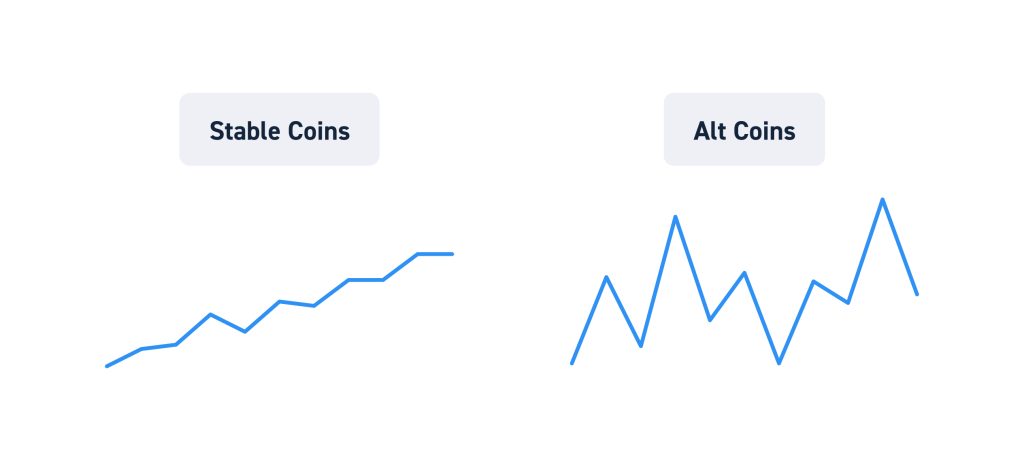Cryptocurrency trading has become mainstream as even the local news will often reference bitcoin prices during extreme price movements. It’s time to get on board with at least having an understanding of cryptocurrency (cryptos) and even considering trading them through a stock broker.
Before discussing how you can trade cryptocurrencies with your stock broker, let’s get a better understanding of how cryptos work, how they differ from stocks, and why they are so popular.
What is a Cryptocurrency?
Cryptocurrency, also referred to as “crypto”, is decentralized digital money that can be used as a trading instrument or a form of payment where applicable. Every transaction is verified and posted on the blockchain. There are hundreds of different cryptos with more being added every month. However, only the really popular ones tend to be tradeable and liquid.
Popular Cryptocurrencies
The most popular cryptos carry the most liquidity. You’ve likely heard of Bitcoin and Ethereum (ether), which are two of the most popular cryptos. Bitcoin is often synonymous with cryptos.
Stablecoins vs. Alt Coins
A stablecoin is a digital currency that has relatively “stable” prices because it’s backed by other assets including liquid commodities, futures, crypto or fiat currency. This enables algorithms to properly hedge for volatility and keep prices relatively flat and liquid.
Alt coins, on the other hand, can be extremely volatile as liquidity fluctuates drastically especially among the more obscure cryptos. Many traders consider any crypto outside of bitcoin and Ethereum as alt coins since they are the alternates to the most well-known cryptos.

Rise in Popularity
Crypto trading has increased in popularity over the past decade as it becomes more and more mainstream. It’s common to see reporting of large bitcoin price swings on the nightly news. Even the financial news networks display bitcoin prices along with benchmark indexes like the Dow Jones and S&P 500. The rise of zero-commission fintech apps has also helped usher in new crypto traders rapidly.
Cryptocurrencies vs. Stocks
There are distinct similarities and differences between cryptos and stocks. They are both tradeable and investable instruments. Like stocks, liquidity can vastly differ between more popular cryptos and the more obscure alt coins.
Cryptos are a relatively new trading vehicle and that makes them more risky. Cryptos are traded 24-hours a day, 7-days a week compared to stocks which mostly trade from 9:30 am EST to 4:00 pm EST, Monday through Friday.
Cryptos are difficult to short-sell as most brokers won’t allow it since it requires margin and liquidity. Cryptos can cost more to trade since brokers tend to charge either or both a commission and spread for each transaction.
The IRS treats cryptos as property and has distinct rules of what it considers capital gains, which must be claimed by U.S. citizens. In fact, regulation is the biggest difference as stocks are fully regulated while cryptos are in the early stages of regulation.

Common Ways to Trade Crypto
Cryptos are traded through digital wallets, crypto exchanges, and brokers.
As the name implies, a digital wallet acts as a virtual wallet that holds your digital assets including cryptos. Cryptos can be transferred, traded, and exchanged through a digital wallet.
Seasoned traders may opt to trade through a crypto exchange which will enable a wider range of alt coins and even provide margin trading. Most new crypto traders use a crypto exchange to make trades.
How to Trade Cryptocurrency with a Stock Broker
For most traders, a stock broker will be the gateway or introduction into the crypto world.
While you cannot buy and sell crypto currencies in the same account you trade equities, you can still get exposure to crypto through other trading vehicles.
Stock traders that want exposure in cryptos can utilize crypto futures and exchange traded funds (ETFs). Traders looking for liquidity and momentum can also trade crypto-related companies (i.e., miners, technology, etc.), who tend to move in alignment with bitcoin. This allows traders to be exposed to crypto markets without actually owning cryptocurrencies directly.

Stock Brokers vs. Crypto Exchanges
For experienced crypto traders, crypto exchanges provide a larger variety of cryptos to trade including thin alt coins. There are pros and cons to both stock brokers and crypto exchanges.

Stock Broker Pros
Using a stock broker allows you to keep your stock trades and crypto trades in the same account under one roof. Stock brokers are regulated and reputable which should give you confidence in keeping your assets at one brokerage. Crypto markets are susceptible to fraud, especially the alt coins, so it’s important to have peace of mind knowing a reputable broker is housing your crypto related transactions.
Stock Broker Cons
On the downside, stock brokers usually don’t enable you to hold or trade the actual cryptocurrencies. The stock brokers that allow crypto trading will usually require a separate agreement and orders may flow through a separate clearing firm. Even with crypto trading enabled, the selection of cryptos are limited to the most liquid and common names to cap the risk.
Crypto traders who want exposure to a broad range of cryptocurrencies will likely prefer a specialized crypto exchange.
Crypto Exchange Pros
Trading through a crypto exchange will give you access to a much larger universe of alt coins. Crypto exchanges may provide you margin and the ability to short-sell certain cryptos. Keep in mind that leverage is a double-edged sword that can backfire quickly if mismanaged. Crypto exchanges enable you to trade cryptos directly as well as the ability to send and receive and covert cryptos.
Crypto Exchange Cons
On the downside, crypto exchanges can have security issues as well as the lack of tight regulation exposes traders to potential fraud. Since cryptos are not FDIC insured, there is a lack of trust as well. The commissions can be much higher than ETFs and futures. Seasoned stock traders will notice the sophomoric nature of charting tools as the platforms can be clunky with convoluted trade executions. Charting platforms are lacking with indicators and studies.
Should You Trade Crypto Through Your Broker?
This is a matter of experience and preference. If you are a stock trader and a casual crypto trader, then you may consider using a stock broker to acclimate yourself to the crypto market. Beginners to crypto may benefit by starting with a stock broker.
Stock brokers provide access to select cryptos through ETFs, stocks, and futures. If you are a more active crypto trader, then you may consider using a crypto exchange to have access to a wider universe of cryptos. It’s important that you don’t jump in head first without studying the underlying assets and markets ahead of time. As with any trading instrument, risk management is at the top of the list of important skills to implement.






